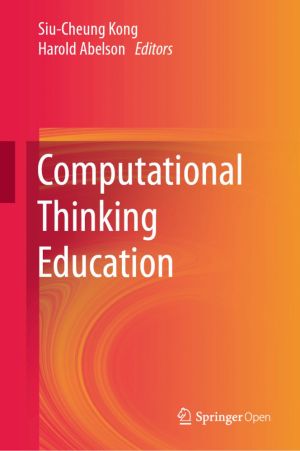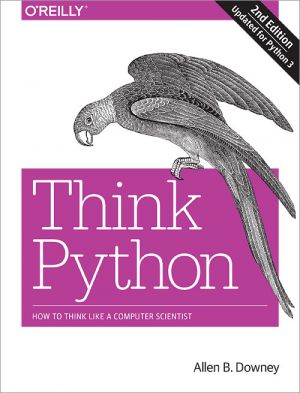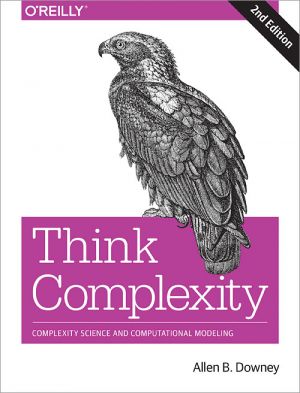Think Complexity
Complexity Science and Computational Modeling
by Allen Downey
DescriptionTable of ContentsDetailsHashtagsReport an issue
Whether you're an intermediate-level Python programmer or a student of computational modeling, you'll delve into examples of complex systems through a series of worked examples, exercises, case studies, and easy-to-understand explanations.
In this updated second edition, you will: Work with NumPy arrays and SciPy methods, including basic signal processing and Fast Fourier Transform; Study abstract models of complex physical systems, including power laws, fractals and pink noise, and Turing machines; Get Jupyter notebooks filled with starter code and solutions to help you re-implement and extend original experiments in complexity; and models of computation like Turmites, Turing machines, and cellular automata; Explore the philosophy of science, including the nature of scientific laws, theory choice, and realism and instrumentalism.
Ideal as a text for a course on computational modeling in Python, Think Complexity also helps self-learners gain valuable experience with topics and ideas they might not encounter otherwise. 






Book Description
Complexity science uses computation to explore the physical and social sciences. In Think Complexity, you'll use graphs, cellular automata, and agent-based models to study topics in physics, biology, and economics.Whether you're an intermediate-level Python programmer or a student of computational modeling, you'll delve into examples of complex systems through a series of worked examples, exercises, case studies, and easy-to-understand explanations.
In this updated second edition, you will: Work with NumPy arrays and SciPy methods, including basic signal processing and Fast Fourier Transform; Study abstract models of complex physical systems, including power laws, fractals and pink noise, and Turing machines; Get Jupyter notebooks filled with starter code and solutions to help you re-implement and extend original experiments in complexity; and models of computation like Turmites, Turing machines, and cellular automata; Explore the philosophy of science, including the nature of scientific laws, theory choice, and realism and instrumentalism.
Ideal as a text for a course on computational modeling in Python, Think Complexity also helps self-learners gain valuable experience with topics and ideas they might not encounter otherwise.
This open book is licensed under a Creative Commons License (CC BY-NC-SA). You can download Think Complexity ebook for free in PDF format (6.6 MB).
Table of Contents
Preface
Chapter 1
Complexity Science
Chapter 2
Graphs
Chapter 3
Small World Graphs
Chapter 4
Scale-free networks
Chapter 5
Cellular Automatons
Chapter 6
Game of Life
Chapter 7
Physical modeling
Chapter 8
Self-organized criticality
Chapter 9
Agent-based models
Chapter 10
Herds, Flocks, and Traffic Jams
Chapter 11
Evolution
Chapter 12
Evolution of cooperation
A Reading list
Book Details
Title
Think Complexity
Subject
Computer Science
Publisher
O'Reilly Media, Green Tea Press
Published
2018
Pages
228
Edition
2
Language
English
ISBN13 Digital
9781492040200
ISBN10 Digital
1492040207
PDF Size
6.6 MB
License

Related Books

The overall aim of this book, an outcome of the European FP7 FET Open NESS project, is to contribute to the ongoing effort to put the quantitative social sciences on a proper footing for the 21st century. A key focus is economics, and its implications on policy making, where the still dominant traditional approach increasingly struggles to capture ...

In this truly unique technical book, today's leading software architects present valuable principles on key development issues that go way beyond technology. More than four dozen architects - including Neal Ford, Michael Nygard, and Bill de hOra - offer advice for communicating with stakeholders, eliminating complexity, empowering developers, ...

This book offers a comprehensive guide, covering every important aspect of computational thinking education. It provides an in-depth discussion of computational thinking, including the notion of perceiving computational thinking practices as ways of mapping models from the abstraction of data and process structures to natural phenomena. Further, it...

If you want to learn how to program, working with Python is an excellent way to start. This hands-on guide takes you through the language a step at a time, beginning with basic programming concepts before moving on to functions, recursion, data structures, and object-oriented design. This second edition and its supporting code have been updated for...

This book discusses the learning and teaching of geometry, with a special focus on kindergarten and primary education. It examines important new trends and developments in research and practice, and emphasizes theoretical, empirical and developmental issues. Further, it discusses various topics, including curriculum studies and implementation, spat...

This book provides a practical philosophy for promoting students' sophisticated thinking from Early Childhood to PhD in ways that explicitly interconnect across the years of education. It will help teachers, academics and the broader learning and teaching community to understand and implement these connections by introducing a conceptual frame...

